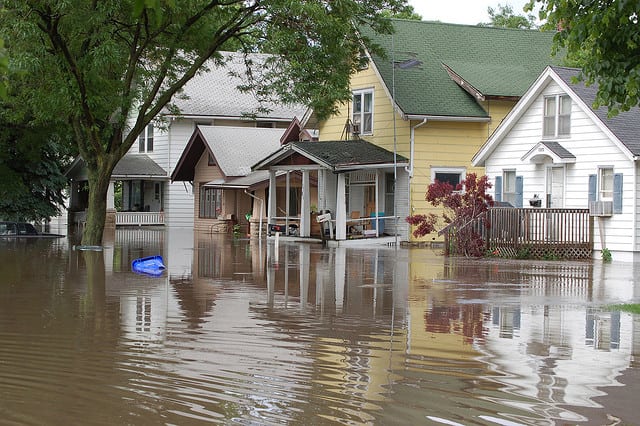We’ve had a lot of rain lately and if you’re like most people in North Carolina and South Carolina get probably dealing with a lot of water on your property. The tips I’m going to provide you today may not be important now but it can prepare you for a flood in the future, make you more aware of your surroundings and protect your home.
Before a Flood
If we know a flood is coming or a lot of rain you’ll want to monitor your surroundings and the local radio weather station. If there’s a flash flood warning you want to get to higher ground immediately and out of any low-lying areas subject to flash flooding. Flash floods can hit instantly and carry you away quickly.
You want to make sure you have an extra drinking water, fill clean containers and have a little bit of extra food that doesn’t require a new refrigeration. You’ll also want to make sure you have first aid supplies, a small amount of cash, toiletries, battery-powered radio, extra batteries and flashlights.
You want to make sure that you are prepared to evacuate and have a secure place that you can go and contact other family members or friends. Move any valuables or furniture to higher levels if possible and move any hazardous materials such as paint, oil and pesticides to hire locations. Disconnect electrical appliances and tie down any exterior items such as lawn furniture, garbage cans or movable objects.
Consider obtaining flood insurance. It does not add very much on to your homeowners insurance and can really save you should you be caught in a flood. If you do get flood insurance, write down your policy number, phone numbers of your agent, and your insurance company’s main member and keep it with you at all times.
During
If you have found yourself in the midst of a flood you still want to stay alert and not drive anywhere if you don’t have to. Make sure your vehicle has enough fuel though and follow recommended routes. You want to know these evacuation routes before flood hits. Be especially cautious at night and if water rises around your car leave the vehicle immediately climbing to higher ground. Never drive through any flooded roadways and never try to walk or swim through flowing water, it can move much faster than expected.
After
If you’ve recently been through a flood continue listening to the weather radio until it is safe to return. Do not visit disaster areas or hamper any emergency response teams. Follow all recommended routes to and from your home and stay away from washed out roads. If the building has been flooded you want to check for safety before entering and any structural damage. Turn off any outside gas lines at the meter tank and don’t enter a building that has been flooded until building officials have cleared it.
If you have flood insurance, take pictures of the damage, both of the buildings and its contents. Seek medical care if need be and seek out the American Red Cross for any additional food, clothing and shelter. Wells should be pumped out before drinking and throw away any food or medicine that has been contaminated by floodwaters.
You’ll want to clean and disinfect anything that got wet and keep children away from flooded areas. Keep the power off and tell an electrician has inspected and approved the electrical devices in your home.
Preventing
There are a lot of ways to prevent flooding of your home. You want to fix any leaks immediately, close up any foundation cracks with masonry caulk, and clear all gutters and drains that could carry water away from your home.
Considering investing in a battery powered sump pump to pump water out of your home or basement.
Anchor your fuel tanks so that they do not float, rupture or release fuel. And prevent a sewer backup by installing septic line check valves which allow waste to flow only one direction. If you live on a slope, consider installing French drains, which collects water in your yard and labor to safely away from your house.
Finally, catalog all your possessions using a digital camera and create a home inventory for insurance purposes.
Flooding is a reality for many people that live along the coastline but with our recent rain people that may not have experienced a flood before are now in the midst of cleaning up. We want you to stay safe, healthy, and enjoy your home for years to come. [Source] Image by U.S. Geological Survey

